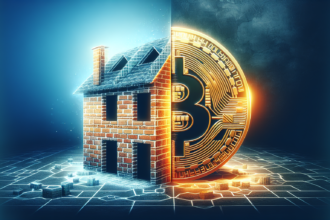Understanding Blockchain Technology in Real Estate Investments
What is Blockchain Technology?
Blockchain is a decentralized, distributed ledger technology that securely records transactions across multiple computers. Each transaction is grouped into a block, which is linked to the previous block, forming a chain of records. This system is immutable, meaning that once data has been entered, it cannot be altered, ensuring transparency and trust. In real estate, blockchain provides innovative solutions that challenge traditional practices, offering enhanced efficiency and reduced costs.
Streamlining Property Transactions
Traditionally, the real estate transaction process involves multiple intermediaries—agents, brokers, title companies, and lawyers—each adding layers of complexity and cost. Blockchain simplifies this by allowing direct transactions between buyers and sellers through smart contracts. These self-executing contracts automatically enforce and execute terms when predefined conditions are met, significantly speeding up transaction processes.
Enhancing Transparency and Trust
One of the fundamental challenges in real estate investments is the lack of transparency. Property ownership records can be ambiguous or fragmented, leading to disputes. Blockchain technology provides a single, tamper-proof ledger accessible to all parties involved. This transparent system allows users to verify property ownership histories and legal standing efficiently, reducing the risk of fraud and disputes.
Lowering Costs and Increasing Efficiency
The elimination of intermediaries in real estate transactions reduces costs associated with commissions, legal fees, and administrative overhead. By employing blockchain, stakeholders can facilitate faster processing of sales, leading to quicker closings. The efficiency gains stem from automated processes enabled by smart contracts, which minimize human error and streamline operations.
Fractional Ownership and Improved Liquidity
Blockchain technology enables fractional ownership of properties. Through the issuance of security tokens representing shares in real estate assets, investors can buy fractions of high-value assets. This democratizes real estate investment, allowing smaller investors to participate in markets that were once accessible only to wealthy individuals. Increased liquidity in real estate holdings appeals to a broader range of investors, enhancing capital flows within the sector.
Tokenization of Real Estate Assets
Tokenization is the process of converting ownership of a real estate asset into digital tokens stored on a blockchain. Each token represents a share of ownership in the property. This innovative approach enables seamless investment opportunities, providing greater access to diverse real estate portfolios. Tokenized real estate offers a unique blend of stability from traditional assets with the flexibility of digital finance, appealing to tech-savvy investors and institutions alike.
Smart Contracts in Real Estate
Smart contracts automate standard procedures in real estate, such as lease agreements and property sales. Using blockchain, smart contracts can automatically trigger actions when certain conditions are met. For instance, a property rental payment can be programmed to transfer funds directly on the due date, reducing late payments and misunderstandings. Consequently, this efficiency leads to enhanced tenant-landlord relationships and streamlined property management operations.
Mitigating Fraud and Reducing Risks
The secure, transparent nature of blockchain makes it inherently resistant to fraud. By holding immutable records of ownership, every prior transaction is accessible and verifiable. Potential buyers can conduct due diligence with confidence, viewing verified ownership titles online without the typical exhaustive searches that characterize traditional practices. This capability significantly reduces risks and enhances protection against fraudulent schemes.
International Transactions Made Simple
Blockchain technology simplifies cross-border real estate transactions. Traditional international property investments involve complex legal frameworks and currency conversions, often leading to delays and additional costs. By utilizing blockchain, international buyers can complete transactions in cryptocurrency or stablecoins, bypassing traditional banking systems. This innovation enhances accessibility for global investors, empowering them to seize opportunities across international markets.
Regulatory Considerations
While blockchain offers vast potential in real estate, regulatory frameworks are still evolving. Governments are grappling with how to regulate blockchain transactions effectively. Investors must remain informed about the relevant legal obligations related to real estate tokenization, smart contracts, and cryptocurrency use. Engaging legal experts well-versed in blockchain will help navigate these complexities.
Real-World Implementations
Several companies and platforms are already leveraging blockchain technology in real estate. Established firms like Propy enable buying and selling property with cryptocurrency, while companies like RealT specialize in tokenizing properties for fractional ownership. Additionally, organizations are working with local governments to create blockchain-based land registries, simplifying public access to property information.
Challenges and Limitations
Despite its benefits, the adoption of blockchain technology faces challenges. One notable limitation is the current technological infrastructure in many developing regions, which may not support blockchain functionality. Additionally, widespread digital literacy is crucial for enabling investors to use blockchain solutions effectively. Education around cryptocurrency, blockchain operations, and security practices will be essential for driving adoption.
The Future of Blockchain in Real Estate
As blockchain technology continues to mature, its integration within real estate investments is expected to deepen. The emergence of improved regulatory standards and a heightened understanding of the technology among investors will fuel its acceptance. Innovations like decentralized finance (DeFi) and continued advancements in smart contracts will further transform how assets are bought, sold, and managed.
Final Thoughts on Blockchain Impacts
The potential of blockchain to reshape real estate investments is significant. By streamlining processes, enhancing transparency, reducing costs, and providing new investment opportunities, blockchain technology is redefining how individuals and institutions interact with real estate markets. As awareness and understanding of blockchain grow, its full impact on the real estate landscape will continue to unfold, paving the way for a future supported by transparency and efficiency.















